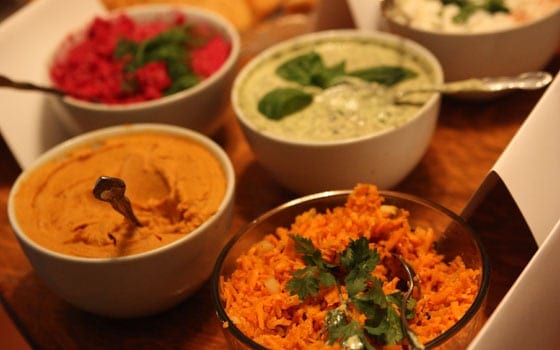

Mezze spread by Chef Nadine Nelson of Global-Local Cuisine chief chef for Summer Sol.

Mezze spread by Chef Nadine Nelson of Global-Local Cuisine chief chef for Summer Sol.
As the local food movement continues to gain traction in Massachusetts, one local non-profit organization, theMOVE, is focusing on making food knowledge and engagement with farmers accessible to urban youth.
“When people think of food as environmental … I reject that idea,” says Dave Madan, founder and executive director of theMOVE. “The primary piece is the human piece.”
That human piece, Madan says, consists of the labor required to produce food, the farm’s surrounding communities and the resulting overall consumer health.
“It’s very easy in cities to forget the origin of what’s coming into our lives,” Madan says. “We encourage youth to build that connection with where food is coming from.”
Madan founded theMOVE in March 2012 to provide day trips to Massachusetts farms for Boston area residents from underserved communities.
“Low-income people, people of color … on all ends of the spectrum, we often end up the most disadvantaged in this [food] process,” says Madan, 29, who grew up in an immigrant Indian family in Cambridge.
Most groups who take theMOVE’s trips are school and community organizations, which this year have included the Mayor’s Youth Council, Roxbury Community College Upward Bound, and East Boston High School. Seventy-five percent of all farm trip participants are people of color, and 73 percent are youth, says Madan.
“We need to figure out how we can mobilize more people around this,” says Madan, who hopes to diversify the group of people involved in the local food movement. “It’s important for our communities to be engaged in this conversation.”
On September 8, Garden Girl TV producer Patti Moreno hosted Summer Sol, a fundraiser and celebration for theMOVE at her home and garden in Roxbury. Moreno, who produces videos for networks such as HGTV, says that she and Madan share the same goal of empowering the individual.
“I try and empower people and educate on a level they can understand,” Moreno says. “The great thing about Dave [Madan] is his ability to bring people together … to build community around something.”
The Summer Sol event, which hosted 80 guests, served food by local chef Nadine Nelson with ingredients donated from local farms. Nelson says she grew up in Canada and visited family in Jamaica regularly, which gave her the opportunity to feel more connected with nature and farming.
“When people grow up in the city,” Nelson says, “you don’t get to go out in nature. Even adults have never gone to a farm.”
Nelson, who taught Madan as a student when she was a teacher, says one of the great aspects of theMOVE’s trips is their ability to break down barriers and get people engaged with their local farms.
“It’s a nice way to get people connected to their food in a way that is not judgmental,” Nelson says.
While a typical farm-volunteer day costs between $650 and $800, theMOVE requests a donation of between $150 and $200 from participant groups because “our whole goal is to make this accessible,” Madan says. The non-profit employs just four people and is funded by grants, donations, events, and membership revenue.
Based on theMOVE’s 2012 survey, 94 percent of participants said that the trip caused them to care more about the people and places that produce our food, and 79 percent said the trip would cause them to make changes to their lifestyle.
“To see that transformation in two to three hours, it’s pretty amazing,” Madan says.
As theMOVE grows, Madan hopes to add more social and culture-building activities into their programming to enable people to bring more accountability to the food system.
“Developing a sense of autonomy or greater power in that process,” says Madan, “[and] being able to say ‘Yes, I can have access to healthy food,’ that’s what local is about to me.”






